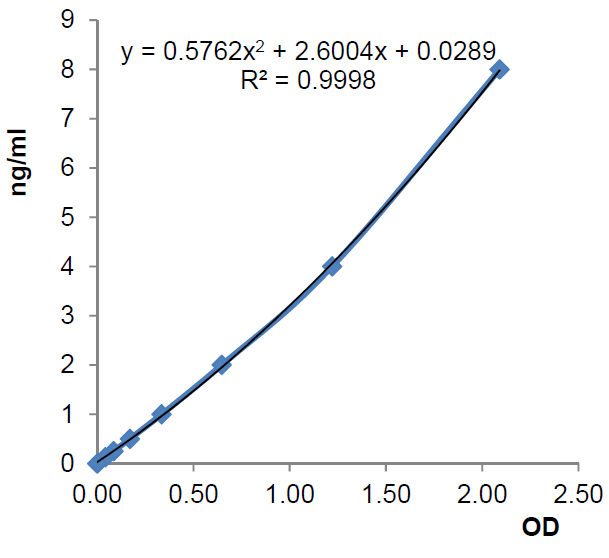Progranulin (mouse) ELISA Kit
Product Code:
AG-45A-0019Y
AG-45A-0019Y
Regulatory Status:
RUO
RUO
Target Species:
Mouse
Mouse
Application:
Enzyme-Linked Immunosorbent Assay (ELISA)
Enzyme-Linked Immunosorbent Assay (ELISA)
Shipping:
Blue Ice
Blue Ice
Storage:
4°C
4°C
No additional charges, what you see is what you pay! *
| Code | Size | Price |
|---|
| AG-45A-0019YEK-KI01 | 96 wells | £550.00 |
Quantity:
| AG-45A-0019YTP-KI01 | 2 x 96 wells | £960.00 |
Quantity:
Prices exclude any Taxes / VAT
Stay in control of your spending. These prices have no additional charges, not even shipping!
* Rare exceptions are clearly labelled (only 0.14% of items!).
* Rare exceptions are clearly labelled (only 0.14% of items!).
Multibuy discounts available! Contact us to find what you can save.
This product comes from: Switzerland.
Typical lead time: 7-10 working days.
Contact us for more accurate information.
Typical lead time: 7-10 working days.
Contact us for more accurate information.
- Further Information
- Documents
- References
- Show All
Further Information
Alternate Names/Synonyms:
Proepithelin; PEPI; PC Cell-derived Growth Factor
Assay Type:
Sandwich
Detection Type:
Colorimetric
EClass:
32160000
Form (Short):
liquid
Handling Advice:
After standard reconstitution, prepare aliquots and store at -20°C.Avoid freeze/thaw cycles.Plate and reagents should reach room temperature before use.
Long Description:
ELISA Assay. Detects mouse progranulin. Does not cross-react with human progranulin. Colorimetric assay. Sample Types: Cell Culture Supernatant, Serum. Range: 0.125 to 8ng/ml. Sensitivity: 60pg/ml. Progranulin (PGRN) is a widely expressed pluripotent growth factor which plays a role in processes such as development, wound repair and inflammation by activating signaling cascades that control cell cycle progression and cell motility. Its function in the central nervous system is of interest, as mutations in the PGRN gene were found in cases of frontotemporal degeneration (FTLD). In addition, PGRN has also been linked to tumorigenesis. New cutting-edge publications have shown that progranulin might be a biomarker not only for FTLD, but also for other types of Alzheimer's disease (AD). This new data even supposes the potential of progranulin to be a biomarker for MCI (Mild Cognitive Impairment), which would be a hallmark in AD research. Additionally, PGRN is described as a new ligand of TNF receptors and a potential therapeutic against inflammatory disease like arthritis.
NCBI, Uniprot Number:
P28798
Package Type:
Box
Product Description:
Progranulin (PGRN) is a widely expressed pluripotent growth factor which plays a role in processes such as development, wound repair and inflammation by activating signaling cascades that control cell cycle progression and cell motility. Its function in the central nervous system is of interest, as mutations in the PGRN gene were found in cases of frontotemporal degeneration (FTLD). In addition, PGRN has also been linked to tumorigenesis. New cutting-edge publications have shown that progranulin might be a biomarker not only for FTLD, but also for other types of Alzheimer's disease (AD). This new data even supposes the potential of progranulin to be a biomarker for MCI (Mild Cognitive Impairment), which would be a hallmark in AD research. Additionally, PGRN is described as a new ligand of TNF receptors and a potential therapeutic against inflammatory disease like arthritis.
Range:
0.125 to 8ng/ml
Sample Type:
Cell Culture Supernatant, Serum
Sensitivity:
60pg/ml
Specificity:
Detects mouse progranulin. Does not cross-react with human progranulin.
Transportation:
Non-hazardous
UNSPSC Category:
ELISA Kits
UNSPSC Number:
41116126
Use & Stability:
12 months after the day of manufacturing. See expiry date on ELISA Kit box.
Documents
References
Microglial upregulation of progranulin as a marker of motor neuron degeneration: T. Philips, et al.; J. Neuropathol. Exp. Neurol. 69, 1191 (2010) | Progranulin enhances neural progenitor cell proliferation through glycogen synthase kinase 3beta phosphorylation: T. Nedachi, et al.; Neuroscience 185, 106 (2011) | The frontotemporal lobar degeneration risk factor, TMEM106B, regulates lysosomal morphology and function: O.A. Brady, et al.; Hum. Mol. Genet. 22, 685 (2013) | Dissociation of frontotemporal dementia-related deficits and neuroinflammation in progranulin haploinsufficient mice: A.J. Filiano, et al.; J. Neurosci. 33, 5352 (2013) | Progranulin and a five transmembrane domain-containing receptor-like gene are the key components in receptor activator of nuclear factor B (RANK)-dependent formation of multinucleated osteoclasts: J. Oh, et al.; J. Biol. Chem. 290, 2042 (2015) | Effects of exercise on progranulin levels and gliosis in progranulin-insufficient mice: A.E. Arrant, et al.; eNeuro 2, e0061-14.2015 (2015) | Trehalose upregulates progranulin expression in human and mouse models of GRN haploinsufficiency: a novel therapeutic lead to treat frontotemporal dementia: C.J. Holler, et al.; Mol. Neurodegener. 11, 46 (2016) | Progranulin deficiency leads to severe inflammation, lung injury and cell death in a mouse model of endotoxic shock: Y. Yu, et al.; J. cell Mol. Med. 20, 506 (2016) | Progranulin regulates lysosomal function and biogenesis through acidification of lysosomes: Y. Tanaka, et al.; Hum. Mol. Genet. 26, 969 (2017) | Progranulin Gene Therapy Improves Lysosomal Dysfunction and Microglial Pathology Associated with Frontotemporal Dementia and Neuronal Ceroid Lipofuscinosis: A.E. Arrant, et al.; J. Neurosci. 38, 2341 (2018) | Progranulin promotes immune evasion of pancreatic adenocarcinoma through regulation of MHCI expression: P.F. Cheung, et al.; bioRxiv (Preprint) (2021) | Neuropathological and behavioral characterization of aged Grn R493X progranulin-deficient frontotemporal dementia knockin mice: J. Frew & H. Berge Nygaard; Acta Neuropathol. Commun. 9, 57 (2021)



